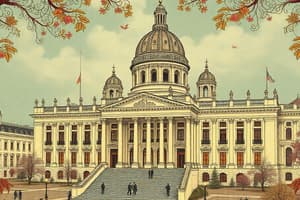Podcast
Questions and Answers
What is political theory?
What is political theory?
Branch of political science dealing with fundamental questions of political life.
What were the main concerns of ancient political theory?
What were the main concerns of ancient political theory?
Foundations of political life and ideal forms of government
Who were key figures in ancient political theory?
Who were key figures in ancient political theory?
Plato and Aristotle
What were Thomas Hobbes' views on government?
What were Thomas Hobbes' views on government?
What did John Locke advocate for in modern political theory?
What did John Locke advocate for in modern political theory?
What methods do political theorists use to answer fundamental questions?
What methods do political theorists use to answer fundamental questions?
What are some subfields of contemporary political theory?
What are some subfields of contemporary political theory?
What is democracy?
What is democracy?
What is authoritarianism?
What is authoritarianism?
What is federalism?
What is federalism?
Give an example of a political institution.
Give an example of a political institution.
What are some examples of political processes?
What are some examples of political processes?
What does political behavior study?
What does political behavior study?
What is voting in the context of political behavior?
What is voting in the context of political behavior?
What is participation in the context of political behavior?
What is participation in the context of political behavior?
What is socialization in the context of political behavior?
What is socialization in the context of political behavior?
What is the study of political theory concerned with?
What is the study of political theory concerned with?
Define anarchy in the context of political theory.
Define anarchy in the context of political theory.
What does political obligation entail?
What does political obligation entail?
What is the primary focus of modern history?
What is the primary focus of modern history?
How does history help us understand the present?
How does history help us understand the present?
What are some key concepts in political theory?
What are some key concepts in political theory?
What is the period referred to as modern history?
What is the period referred to as modern history?
What were some key events and developments in modern history?
What were some key events and developments in modern history?
What is the Industrial Revolution?
What is the Industrial Revolution?
What were the World Wars?
What were the World Wars?
What was the Cold War?
What was the Cold War?
What is decolonization?
What is decolonization?
What is the significance of political theory?
What is the significance of political theory?
What does modern history shed light on?
What does modern history shed light on?
What is the aim of studying subfields like political theory and modern history?
What is the aim of studying subfields like political theory and modern history?
What is the main focus of political theory?
What is the main focus of political theory?
Study Notes
Introduction
Political science is a broad field that encompasses the study of political systems, institutions, and processes, as well as the analysis of political behavior. This article will delve into the subtopics of political theory, offering a comprehensive understanding of the various aspects of political science.
Political Theory
Political theory is a branch of political science that deals with the fundamental questions of political life, such as:
- What is the best form of government?
- What is justice?
- What is the role of the state in society?
- How should political power be distributed?
Political theorists use a variety of methods to answer these questions, including philosophical analysis, historical and comparative analysis, and normative and positive theorizing.
Ancient Political Theory
Ancient political theory was concerned with understanding the foundations of political life and the ideal forms of government. Key figures include Plato, who believed in the rule of philosopher-kings, and Aristotle, who advocated for a mixed government that combined elements of democracy and aristocracy.
Modern Political Theory
Modern political theory has been shaped by the works of influential thinkers such as Thomas Hobbes, who argued for a strong central government to maintain social order, and John Locke, who advocated for individual rights and limited government.
Contemporary Political Theory
Contemporary political theory has expanded to include various subfields, such as feminist theory, critical race theory, and green political theory, which explore the intersection of politics and other aspects of human experience.
Political Systems
Political systems are the structures and institutions through which political power is exercised and decisions are made. There are various types of political systems, including:
- Democracy: A system in which power is vested in the people, who exercise it either directly or through elected representatives.
- Authoritarianism: A system in which power is concentrated in the hands of a single leader or a small elite, with little or no input from the general population.
- Federalism: A system in which power is divided between a central government and regional governments.
Political Institutions
Political institutions are the formal structures that facilitate the exercise of political power and the implementation of policy. Examples include legislative bodies, executive branches, and judiciaries.
Political Processes
Political processes refer to the mechanisms and procedures through which political decisions are made and implemented. These include:
- Elections: The process by which citizens choose their political representatives.
- Lawmaking: The process by which political institutions create and amend legislation.
- Public opinion: The collective attitudes and beliefs of a population on political issues.
Political Behavior
Political behavior is the study of how individuals and groups engage in political activities, such as:
- Voting: The act of casting a ballot in an election.
- Participation: The degree to which individuals become involved in political activities.
- Socialization: The process by which individuals learn about politics and develop political attitudes.
In conclusion, political science is a multifaceted field that encompasses the study of political theory, systems, institutions, processes, and behavior. By exploring these various aspects, we can gain a deeper understanding of the political landscape and the forces that shape it.
Studying That Suits You
Use AI to generate personalized quizzes and flashcards to suit your learning preferences.
Description
Explore the subtopics of political science including political theory, ancient and modern political theory, contemporary political theory, political systems, institutions, processes, and political behavior. Gain a comprehensive understanding of the diverse aspects of political science.




